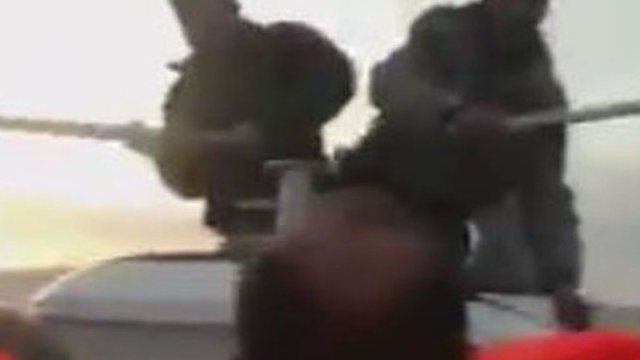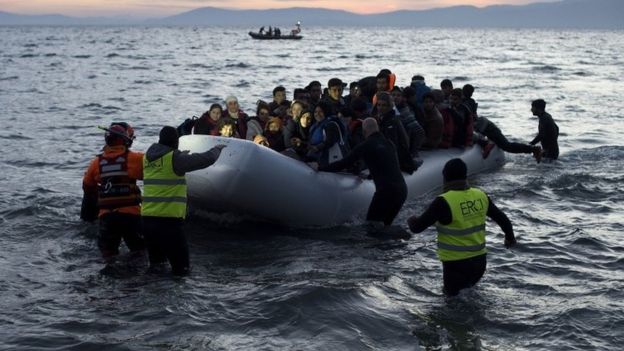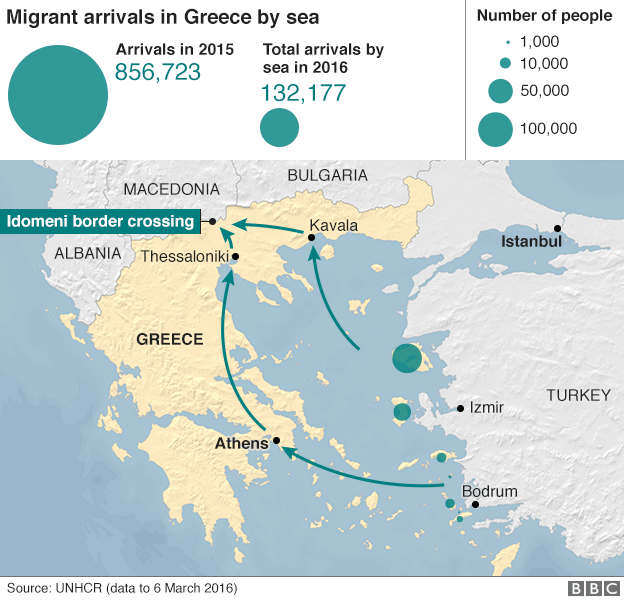Migrant crisis: Turkish guards hit migrant boat with sticks

The incident is said to have happened in Turkish waters as the migrants were on their way to the island of Lesbos.
The migrants accused the coastguard of attacking them, but the coastguard say they were trying to stop the boat without harming the occupants.
The EU and Turkey are discussing new moves to curb the flow of refugees.
Europe is facing its biggest refugee crisis since World War Two. Last year, more than a million people entered the EU illegally by boat, mainly going from Turkey to Greece.
More than 132,000 migrants have arrived by boat into Greece so far this year — a large increase on the same period last year.
The vast majority of coastguard patrols in the Aegean are professional, with Turkish and Greek personnel either towing migrant vessels back ashore or rescuing those that capsize. But there have been reports of attacks.
Masked officials on the Greek side were filmed last year appearing to puncture inflatable dinghies with migrants on board — and now this, with the Turkish coastguard claiming they were merely trying to stop the engine and stop the boat advancing.
It could be that these are individual coastguard officers acting on their own and not following orders, perhaps fuelled by machismo and even xenophobia. But it's also possible that this is more than an isolated case, showing the Turkish authorities going to any length to stem the migration flow under renewed pressure from Brussels.
Either way, it will worry EU leaders meeting later this week to finalise a plan with Turkey to reduce migrant numbers. Could these scenes be repeated as Turkey steps up patrols of Europe's borders?
Disquiet over deal with Turkey
The incident captured on the video is thought to have occurred in Turkish waters opposite the island early on Saturday.
The 30-second clip shows people wearing life jackets on a rubber dinghy being hit with poles by men standing on another vessel. The people on the boat shout out in Farsi and Arabic.
The boat of migrants eventually moved away and made it to Lesbos.
A Turkish coast guard official later confirmed the incident, but said the officers had been trying to stop the engine "without harming the refugees".
He said the standard procedure was to tie migrant vessels to a coast guard boat and bring it back to Turkey, "but this boat of refugees didn't stop the engine and continued on to Greece," he added.
Our correspondent says he has heard of similar incidents involving other migrants.
Most of the migrants reaching Greece are Syrian, fleeing the country's four-year civil war. Another 2.7 million Syrian refugees are currently in Turkey, which is struggling to cope with the influx.
Under the measures discussed by EU leaders and Turkey on Monday, which still need to be agreed, migrants arriving in Greece would be returned to Turkey. For each Syrian sent back, a Syrian already in Turkey would be resettled in the EU.
The EU promised to speed up payment of €3bn ($3.3bn; £2.2bn) promised in October to help Turkey deal with the crisis, with the possibility of additional funding.
Plans to ease access to the EU for Turkish citizens will also be speeded up, with a view to allowing visa-free travel by June.
Hungary's anti-migration PM Viktor Orban has already indicated he may veto the resettlement deal.
The provisional deal, which has been criticised by the UN refugee agency, will be discussed at another meeting of EU and Turkish leaders in Brussels next week.
The crisis has led eight EU members to introduce temporary border controls, leading to fears over the future of the Schengen agreement — the deal which allows passport-free travel across 26 member countries.
A note on terminology: The Bworld.korupciya uses the term migrant to refer to all people on the move who have yet to complete the legal process of claiming asylum. This group includes people fleeing war-torn countries such as Syria, who are likely to be granted refugee status, as well as people who are seeking jobs and better lives, who governments are likely to rule are economic migrants.
Политика конфиденциальности | Правила пользования сайтом










